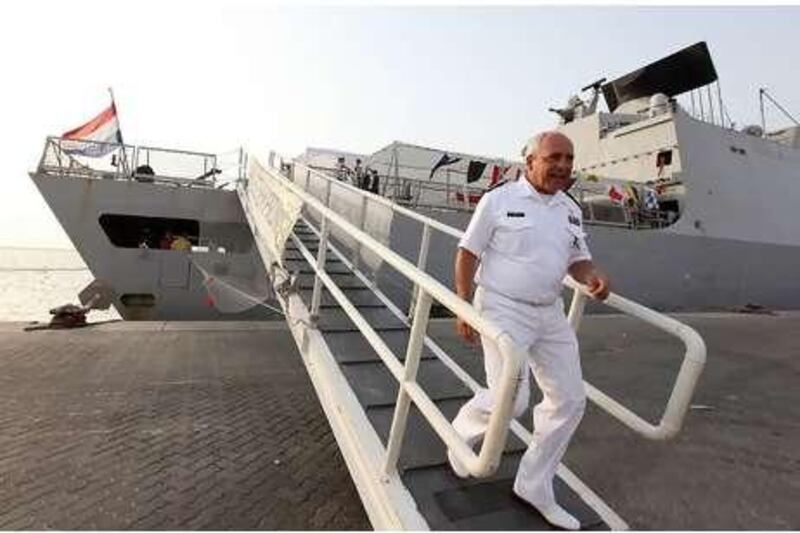DUBAI // Increased naval patrols and the introduction of a transit corridor for merchant vessels have reduced the number of successful pirate attacks off Somalia, the commander of a Dutch warship docked in Port Rashid said yesterday.
"It used to be that one out of two attacks were a success, now it's more like one out of seven," Commodore Michiel Hijmans said aboard his ship De Zeven Provincien, which is part of the Standing Nato Maritime Group 2 conducting counter-piracy operations off the Horn of Africa. Commodore Hijmans, whose crew will be in Dubai until Wednesday, said the introduction of the transit corridor last year was paying dividends. About 30 naval ships from all nationalities patrol that area and have helicopters on standby.
"Besides that we are doing advanced operations just off the coast of the northern part of Somalia to bring the fight to the pirates and try and catch them before they go all the way out to sea," he said. Each year approximately 22,000 ships pass through the Gulf of Aden towards the Suez Canal and back in the US$5 trillion global shipping trade. Organised gangs along the lawless Somali coast have exploited the sea lanes. A number of UAE-owned vessels have been targeted.
US Navy data for the first four months of this year said pirates made 47 attacks off Somalia, up from 37 in the same period last year. Worldwide, attacks jumped more than 30 per cent from 2008, to 406 last year. This year from January through March, however, there were 35 attempted raids, which meant a drop of 27 from the same period last year, according to figures from the International Maritime Bureau. In addition, many of the attacks are unsuccessful. The numbers were given at an anti-piracy meeting at UN headquarters in May.
The Reuters news agency reported on Tuesday that Somali pirates released a fuel oil tanker, which was intercepted en route from the UAE, and a fishing vessel seized in March. And 10 days ago, Somali pirates hijacked the MT Motivator, a chemical tanker, which was attacked at the strait between Djibouti and Yemen with 18 Filipino crewmen taken hostage. "That was the first attack in that area," Commodore Hijmans said. "One of the reasons the problem of piracy is so difficult to tackle is because the area is bigger than the whole mainland of Europe. On top of that, there's a 12-mile radius at the Southern Red Sea where we have no authority."
The Nato force is part of a loose coalition in the Gulf of Aden that includes an EU float, the US-led Combined Maritime Forces and forces from Russia, China, India and Iran, among others. The forces co-ordinate with each other at monthly meetings in Bahrain, but also share tactical data and intelligence reports daily through a system of secure chat rooms on board. On July 6 the forces published and gave to merchant ships a booklet with an overview of ways to best manage a pirate attack. A week later, it is already in its third print. The book contains tips on the best protective measures for seamen to protect themselves, such as razor wire, fake guards, good lookouts and a "strong room" where the crew can lock themselves in while they contact the counter-piracy patrol.
"The difficulty while patrolling is 99 per cent of the calls are false alarm," Commodore Hijmans added. "Most fishermen have anchors that look like grappling hooks and at least one Kalashnikov on board to protect their merchandise." @Email:newsdesk@thenational.ae






